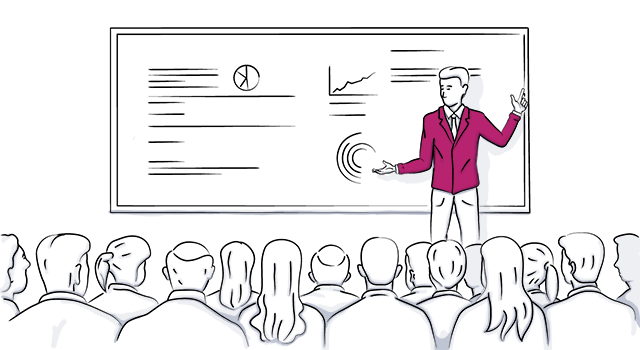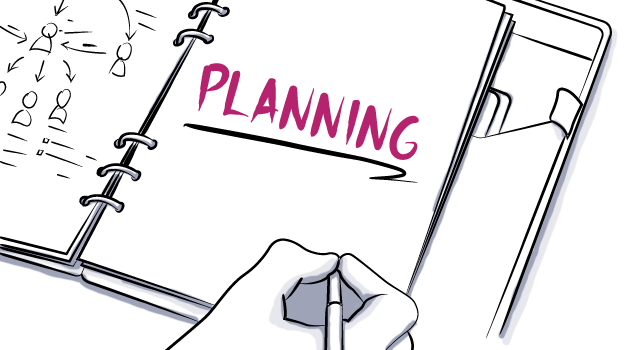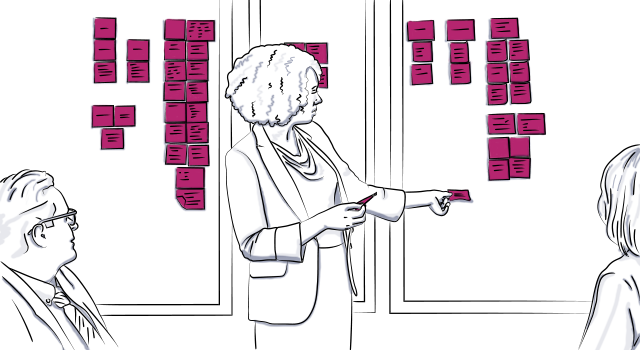
Wednesday Wisdom: Everything You Need to Know About What a Successful Event Manager Does
An event manager oversees the design, set-up, and execution of events that bring people together. These events can run from small networking meetings with a few dozen guests to large-scale conferences with thousands of attendees over several days”and everything in between.
No matter their scope, managing events is always a people-centric endeavor. Your goal is ensuring people get the most from a given event, and you work closely with people to achieve that goal.
Read on to learn what makes event management a rewarding career (if you’re a people person!), the essential skills of a successful event manager, and the secrets of success from top professionals.
What is event management?
Event management is a project management profession focused on every aspect of events, from choosing a location to following up on guest satisfaction.

What’s the difference between the role of an event manager and of an event planner?
For the most part, these job titles are synonymous. Any differences that do exist between the roles primarily come down to how companies and event professionals define the positions for themselves. For example, some may define event managers as working only on large-scale events or handling event-day tasks more than pre-event planning.
But, when you search both terms on LinkedIn or other job boards”many of the same positions turn up in the results, as do ˜event designer’ jobs. Also, the US Bureau of Labor Statistics puts all of these positions under the single occupational category ˜Meeting, Convention, and Event Planners.’
What are the stages of the event management process?
There are five basic stages of event management, though each step contains multiple tasks. Additionally, busy event managers are typically at different stages for numerous events at any given time.

Stage 1: Research, goal setting, and viability assessment
Whether you’re an in-house corporate event manager, or you run an event management company that works with various clients, the first stage is defining the objective of your event and assessing the feasibility of the event. In many instances, this will seem self-evident. The overall event goal is to raise money for a new library wing, celebrate a company’s 20th anniversary, or roll out a new product.
But it’s essential to get more granular. Here are some things to ask your client or discuss with your in-house team:
- For company events: What’s the business case? Will you introduce one product or several? Will there be an educational component?
- For non-profits: What’s the specific fundraising goal? Is the event for long-term donors exclusively? Will the event coincide with a new exhibit?
- For awards ceremonies: Should the F&B happen during the ceremony or after? Should it be a standing cocktail hour or a sit-down affair?
- For networking events: Do you want to improve the sense of community within an organization? Do you want guests to join a new professional Facebook group?
- For social events: Is it a formal or laid-back event? What type of music should there be to ensure all guests have a wonderful time?
This first stage should also include an event viability assessment, which means establishing an event budget and figuring out if it aligns with the event goal. For example, a non-profit organization may learn they don’t have the financial reserves for a gala fundraiser. In this case, the non-profit can postpone the gala for a year and instead organize a low-cost food truck festival with a fundraising element.
Stage 2: Choose your theme and design the event
Next, event managers design the event to meet the specified objectives. This is where the rough sketch of your event comes into focus.
- What will occur during the event?
- Who will perform/speak/teach?
- When and where will this occur?
- What’s the planned layout of tables, chairs, stages, podiums, and F&B?
- What’s the planned style of the setting, backdrop, and other event elements? (Modern, traditional, romantic, steampunk, rustic?)
This is a creative process that can include color, sound, and lighting design for galas and other more theatrical, performance-centered events. For professional events, the focus will be on establishing timelines and seminar activities, branded signs and swag, and deciding on possible speakers.
Event managers and their teams will often collaborate on digital event services tools such as Social Tables so everyone understands the planning trajectory and can call out any problems that arise early on.

Stage 3: Focus on the details for a successful event
Once the event manager and their team settle on a vision for the event, they transition to the details. This stage comprises the bulk of the event management process, and may include the following (depending on the event type):
- Sending RFPs to venues and vendors.
- Hiring venues, vendors, speakers, and performers (and being prepared with backup choices).
- Finalizing contracts with venues, vendors, speakers, and performers.
- Building an event website and customized event app.
- Design post-event surveys.
- Sending guest invites.
- Write event hashtags and launch the pre-event social media campaign.
- Tracking RSVPs and event registration numbers.
- Attendee communications.
- Event marketing and outreach.
- Discussing the event schedule with speakers and performers.
- Client updates and walkthroughs.
- Training event staff and volunteers
- Designing and finalizing critical event documents, such as the event timeline and BOE.
- Checking event wifi and cell service, especially for tech-heavy events.
- Organizing transportation and valet services.
- Designing the event check-in process and creating signage.
- Building swag bags and branded merchandise.

Stage 4: Event execution
This is the main event for any event manager! This is where all the previous stages come to life on the day of, and produce an event that guests appreciate and enjoy.
Depending on the scope of the event, set up may begin the morning of an event or a few days prior. Event execution entails:
- Event vendor and supplier bump in and set up.
- Setting up tables and chairs, centerpieces, floral arrangements, buffet tables, stage, and podiums.
- Final walkthroughs, soundchecks, and technology checks.
- Guest arrival and event check-in.
- Guest services and communication.
- F&B service.
- Managing unexpected problems and emergencies.
- Checking that speakers and performers have what they need and understand their cues.
- Performances and speeches.
- Social media walls and attendee polls.
- Giving out swag bags.
- Managing guest exits.
Stage 5: Post-event guest communications and team debrief
Exceptional event managers don’t consider an event over until they understand how guests, volunteers, clients, and team members responded to the event. This starts during the event itself, with event managers observing guest reactions, talking with attendees, and checking in with guest services about any problems.
Next, they’ll send out a post-event survey from 12 to 48 hours following an event. Event managers design post-event surveys to get the most responses by keeping them short, simple, and friendly.
With the responses in hand, event managers meet with clients to discuss their satisfaction with the outcomes of the event and the survey results. Finally, they’ll discuss what went right and what went wrong with their in-house team, and develop an action plan to avoid similar problems at the next event.

What skills does an event manager need?
Above all, event managers need people skills. The job requires constant interactions with clients, event planning teams, vendor and venue teams, and guests. Every single day, event managers work side-by-side both with team members they know well and people they’ve just met. Other essential skills of event managers include:
- A Marie Kondo-like ability to stay organized
- The ability to multitask
- Happy to work nights and weekends
- Sharp communication and listening skills
- A deep well of creative ideas
- Finds enjoyment in a fast-paced work environment
- Ability to focus amid pandemonium
- Flexibility when inevitable challenges arise
- Confidence in decision making
- Willingness to learn and expand skills
- Passion for the dynamic industry
Read the must-have skills for event planners to take a deeper dive into 6 event industry career skills.
3 Secrets About Dealing with Event Management Responsibilities from Top Event Managers
Beyond the above skills, we collected some unexpected tips from experienced event managers. Here’s are some other qualities they believe can lead to success in the event management industry:
1. Be the calm in the storm
Things will go wrong, that is a given. Don’t be surprised when something doesn’t arrive or gets delivered to the wrong location, a sign is spelled wrong, something breaks, someone is late¦etc. Keep your cool and use your mental toolbox to address and remedy the situation. An event planner can solve huge issues with a smile and keep everyone else calm so as not to cause more stress. When in doubt, just channel some Vanilla Ice…If there’s a problem, yo’ I’ll solve it ” Victoria Blasich, Marketing Manager for tradeshow marketing firm Freemind Seattle. Excerpted from Habits of a Successful Event Manager, a guest blog for the Northwest Event Show website.
2. Develop your business smarts
Events are a service and must be organized in a business-like fashion. Events not only need to attract an appropriately sized audience but the figures need to add up. Event managers need a head for business. Increasingly they are required to know how a business sector works. They need a commercial instinct, ensuring that key decisions are taken in the context of what makes the most business sense. What is best for the events’ balance sheet and not just the event? At some stage in the event planning process you will need to make tough decisions about the direction your event takes. These decisions need taking with the head and not the heart. Again, these are difficult decisions and not always welcome by the team. ” Chris Powell, The Event Expert. Excerpted from The 7 Key Skills of a Successful Event Manager on The Event Expert blog.
3. Engage with (and learn from) others
Social media breaks down barriers and is a great way to keep up to date and connect with influencers that can challenge your way of thinking and working. Take part in Twitter chats, join and contribute to LinkedIn groups, watch thought leaders on YouTube to see new perspectives and trigger new ideas. Go to industry events and hear from some of the top speakers in the world of events. Feel inspired by the fast-paced and exciting industry you are a part of. ” Becki Cross, Managing Director and Event Strategist at Event Northern Ltd. Excerpted from 10 Ways to Be a Better Event Manager on the Event Manager Blog.
Finally, a frequent pearl of wisdom that comes from most event managers: take good care of yourself. Event management and planning is a notoriously stressful profession. If you pursue an event management career, it’s essential that you adopt a stress-reduction strategy to prevent burnout.

Now You Know Everything About What an Event Manager Does!
Discover how Social Tables’ event management software can help you sharpen your professional skills. Or, learn the essential steps to starting an event management business.

